Fresh list indicates thirst for innovating and improving
On June 28, a ceremony to announce the list of Top 50 Innovative Enterprises in Vietnam was jointly held by VIR in collaboration with Viet Research.
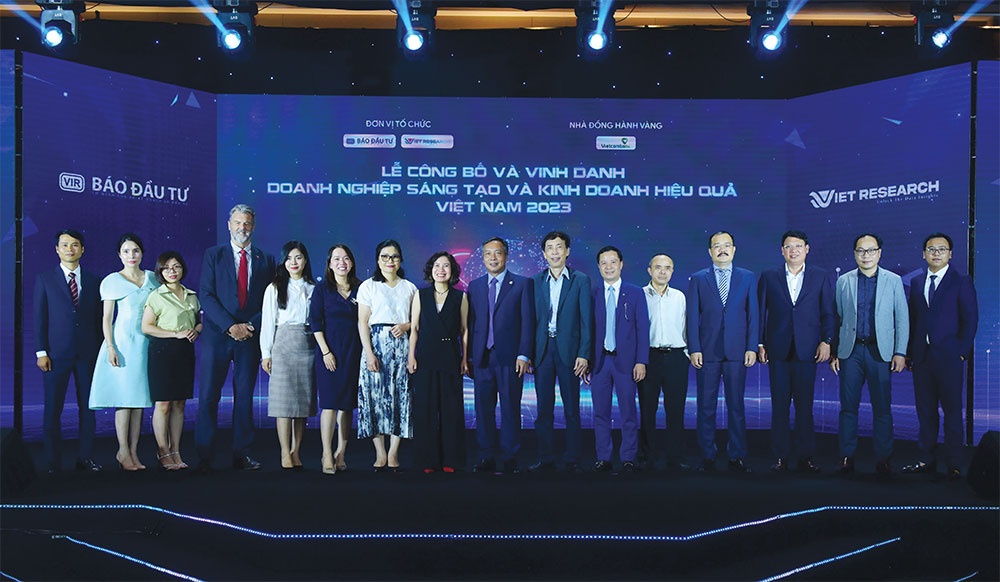 |
This was the first time that the list of Top 50 Innovative Enterprises Vietnam 2023 (VIE50) and Top 10 Innovative Enterprises Vietnam 2023 were announced by key economic sector, including processing and manufacturing, ICT, pharmacy and medical equipment, logistics, banking, insurance, retail, high-tech agriculture, food and beverages, and construction and real estate, based on work by Viet Research. All businesses involved have applied creativity and innovation in activities, contributing to improving production and business efficiency.
According to Nguyen Van Truc, director of Viet Research’s Innovation Research Project, the industry structure of the VIE50 enterprises is predominantly focused on five main groups: processing and manufacturing, technology and telecommunications, finance and banking, healthcare, and logistics. These industries are also at the forefront of promoting innovation, creativity, and improved business efficiency, driven by factors such as international integration, industry competitiveness, increased investment in technology, and human resources in the evolving economic landscape.
“In relation to the scale of operations, a significant portion of VIE50 enterprises consists of medium and large-scale businesses, with an average revenue of approximately $1.96 billion during 2021-2022,” he said.
“It is noteworthy that the VIE50 list also acknowledges a few smaller enterprises due to their exceptional accomplishments in areas such as innovation, product development, service enhancements, process innovation, and the cultivation of a strong corporate culture.”
According to a survey among listed companies, 84 per cent of businesses consider innovation an important key to innovating and improving products, services, and processes, while 70 per cent of businesses expect to increase their budget for innovation for at least the next two years.
“This is the time associated with the saying ‘to be or not to be’ as relating to the Vietnamese economy. Vietnam is entering an unprecedented stage with great development ambitions,” Dr. Vo Tri Thanh, director of the Institute for Brand and Competition Strategy, said in his opening speech at the ceremony.
“With the goal to be a high-middle-income country by 2030 and a high-income developed country by 2045, living in harmony with the environment, nature and society, innovation is definitely the key factor to realise this aspiration.”
Dr. Vu Minh Khuong, associate professor from the Lee Kuan Yew School of Public Policy at the National University of Singapore, also emphasised that innovation was not only a matter of the future but a matter of survival for the country. “Without innovation, Vietnam will not be able to develop,” he said.
However, in recent years, Vietnam’s innovation has been slow due to pandemics, geopolitical influences, and climate change. Citing a report from the Ministry of Planning and Investment, Thanh noted that Vietnam’s labour productivity growth rate was decreasing.
“The country’s economic locomotives like Ho Chi Minh City have a lower labour productivity growth rate than the national average,” he said.
“Numerous countries, including Vietnam, are actively striving to address immediate challenges while also keeping pace with global trends such as green growth, innovation, leveraging the opportunities of the Fourth Industrial Revolution, embracing digital transformation, and effectively managing risks. In this context, the realisation of Vietnam’s aspirations relies heavily on innovation within enterprises.”
According to Khuong, to promote innovation, both the government and businesses must look at root factors.
“To successfully navigate change, enterprises must focus on three key pillars of innovation: efficiency, effectiveness, and adaptability. This entails evaluating the financial impact of innovation, enhancing customer perception and trust through innovative practices, and cultivating the ability to adapt to dynamic business environments,” he said.
Khuong stressed the urgent need for the state to establish an innovation-friendly ecosystem encompassing financial and technological support, regulatory frameworks, institutional structures, technical standards, and conducive conditions for talent acquisition.
“Furthermore, ensuring a fair and competitive environment is essential, as it incentivises enterprises to engage in legitimate business practices that ultimately benefit them. The entire society should come together to provide support to innovative businesses, enabling them to progress,” he said, highlighting significant advancements in innovation that Ho Chi Minh City has made.
World Bank lead economist for Vietnam Andrea Coppola identified several factors that are hampering innovation among startups in Vietnam. According to Coppola, the majority of startups find access to finance and business regulations as the main constraints that need to be addressed. Other issues include collaboration among actors in the ecosystem and access to quantify and skilled labour.
Coppola offered recommendations to promote innovation-led growth in Vietnam. “It’s useful to introduce a one-stop shop where firms can access information and support programmes for innovation. It’s important to adopt international best practices in the design and implementation of innovation and reproduction policies,” Coppola said.
Other solutions include building a support agency, aligning the intellectual property and tech transfer framework in line with international practices, and leveraging private sector resources, either via regulations to unlock domestic finance or improving access to funds for firm upgrading and innovation.
| Andrea Coppola - Lead country economist for Vietnam, World Bank
Vietnam has enjoyed three decades of extraordinary progress. During the last two decades, median household income quadrupled, and extreme poverty dropped from 50 per cent to less than 1 per cent. In recent years, Vietnam weathered shocks like the pandemic better than most countries. The country set even greater goals, aiming to be a high income country by 2045 and a decarbonised economy by 2050. There are headwinds that might threaten income standard targets by 2045, and not just short-term headwinds associated with global monetary tightening and the weakening of global demand, but also long-term challenges. This is because export and foreign funding-led growth model that propelled Vietnam’s economy by exploiting its comparative advantage in cheap labour might be running out of steam. As demographic trends and declining female labour force participation may create a drag on economic growth, faster productivity growth is required to offset these negative impacts. According to the World Bank, total productivity growth may need to double from an average annual rate of 1.7 per cent for 2011-2019 to between 3.3-3.6 per cent between now and 2045. This is very significant, and innovation and technology adoption must and can play a critical role to boost productivity in Vietnam and achieve these goals. While data shows that Vietnamese businesses, both in the manufacturing and the services sector, are still far from the technological frontier, there’s a huge opportunity to close this gap through technology adoption and innovation. In a context of lack of innovation, the digital and green transition that are shaping the world’s future may present challenges, with an impact on labour demand with skill composition of the workforce and firm’s productivity. Vietnam, so far, has been less ready than other countries in terms of innovation in digital technologies, such as cloud computing, cybersecurity, AI, and green technologies such as renewable production. So going forward, it is vital to leverage innovation to transform the challenges presented by the digital and green transition into opportunities for competitiveness, productivity, and growth. |
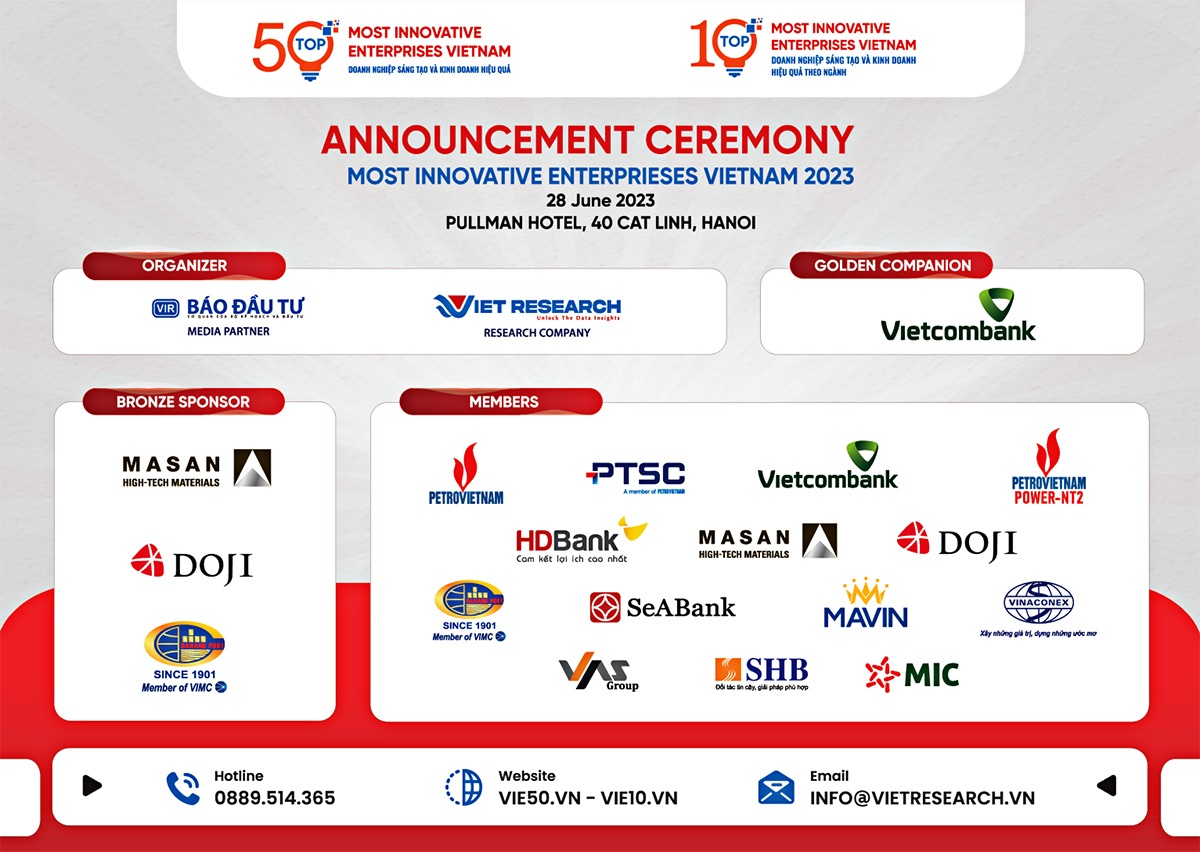 |
 | SABECO in Forbes top 50 listed companies On June 5, Forbes Vietnam unveiled the top 50 listed companies in 2023, including SABECO (Saigon Alcohol, Beer and Beverages Corporation), a leading brand name in the Vietnam beer industry. |
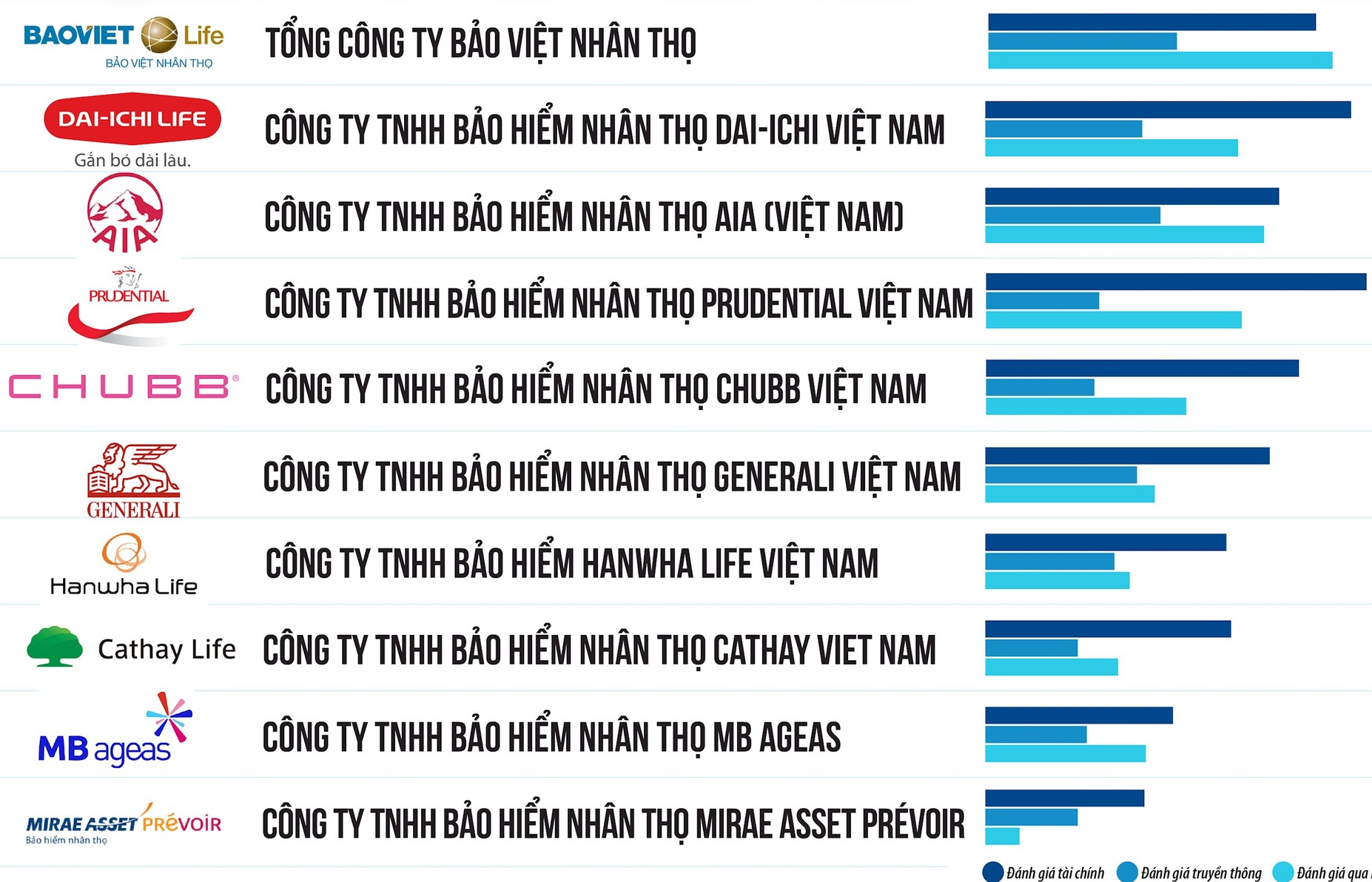 | Vietnam Report reveals Top 10 insurance companies in Vietnam in 2023 Vietnam Report has just released its highly anticipated list of the 10 most reputable insurance companies in Vietnam for 2023. The list encompasses two categories, life insurance and non-life insurance. |
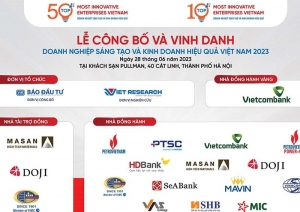 | Top Innovative Enterprises Vietnam 2023 announced The ceremony to announce the list of Top 50 Innovative Enterprises Vietnam and Top 10 Innovative Enterprises Vietnam 2023 organised by VIR in collaboration with Viet Research will take place on June 28 at Pullman Hanoi Hotel. |
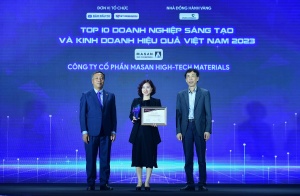 | Masan High-Tech Materials honoured in Top 10 Most Innovative Enterprises Vietnam 2023 Masan High-Tech Materials was named among the 10 Most Innovative Enterprises Vietnam 2023 at the Top 50 Most Innovative Enterprises Vietnam 2023 award presentation ceremony by VIR and Vietnam Research. |
What the stars mean:
★ Poor ★ ★ Promising ★★★ Good ★★★★ Very good ★★★★★ Exceptional
Latest News
More News
- State corporations poised to drive 2026 growth (February 03, 2026 | 13:58)
- Why high-tech talent will define Vietnam’s growth (February 02, 2026 | 10:47)
- FMCG resilience amid varying storms (February 02, 2026 | 10:00)
- Customs reforms strengthen business confidence, support trade growth (February 01, 2026 | 08:20)
- Vietnam and US to launch sixth trade negotiation round (January 30, 2026 | 15:19)
- Digital publishing emerges as key growth driver in Vietnam (January 30, 2026 | 10:59)
- EVN signs key contract for Tri An hydropower expansion (January 30, 2026 | 10:57)
- Vietnam to lead trade growth in ASEAN (January 29, 2026 | 15:08)
- Carlsberg Vietnam delivers Lunar New Year support in central region (January 28, 2026 | 17:19)
- TikTok penalised $35,000 in Vietnam for consumer protection violations (January 28, 2026 | 17:15)


 Tag:
Tag:














 Mobile Version
Mobile Version